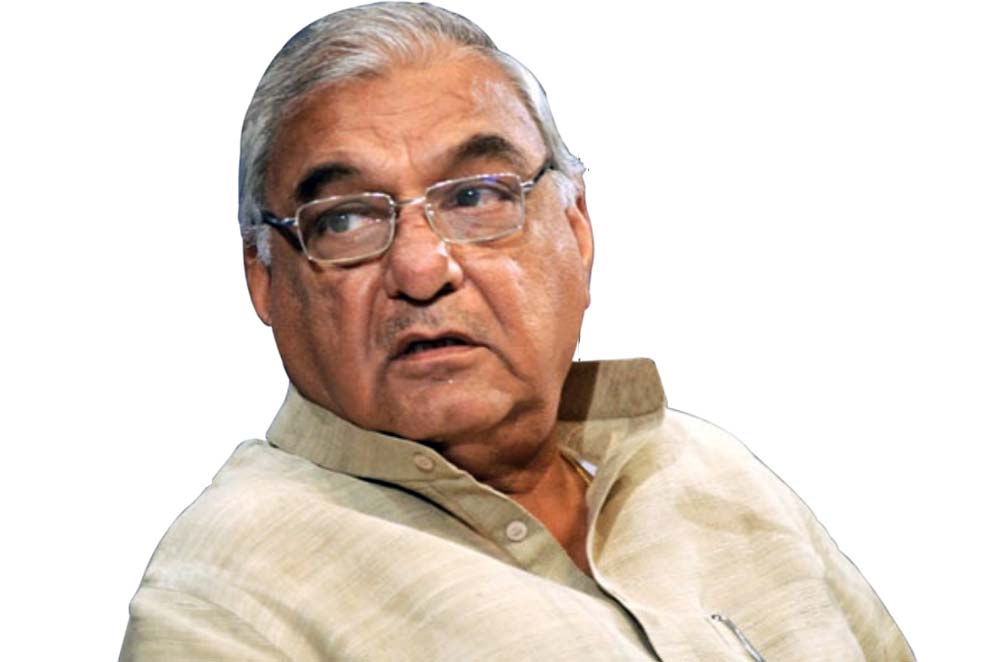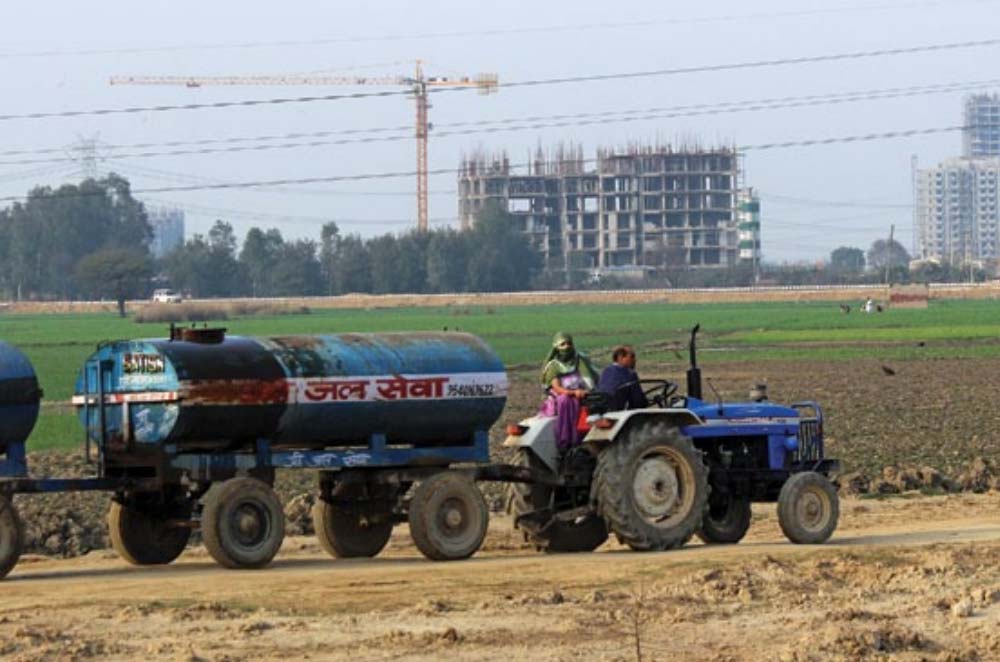“We must speak up irrespective of whether it will have its desired effects or not, because by speaking up we may not guarantee raising the consciousness of the people who listen but by not speaking up we will definitely let the people to remain deaf and dumb”.
When in 2004, the citizens of Haryana elected Bhupinder Singh Hooda first time as their Chief Minister, they must have thought that the monopoly of Lals (Devi Lal, Bhajan Lal and Bansi Lal) will be over. They had breathed a sigh of relief and posed faith in the new leadership of Hooda. Alas! Hooda, alias Bhupi, has belied their hopes and aspirations. Hooda, in his nine years of rule, has emerged as a coloniser, builder and a shrewd businessman who worked only to serve the interest of the elitist class of the country rather than to serve the citizens of Haryana. It is an astonishing scenario where a Chief Minister, who has been elected as a protector and guarantor of a sovereign State in the federal structure of India, allegedly became the plunderer of the State resources. The land, which is the prime source of existence of the farmer in the State, is in the hands of such a Chief Minister, who joined hands with greedy plunderers of the State who have nothing to do with the development of the Haryana and Haryanvis; their main aim is to make a quick buck in the shortest possible time.
 Haryana’s state of affairs is a bizarre example of administrative, political and economic mismanagement, where the whole administrative machinery connived and surrendered to serve the builder mafia rather than to serve the poor and the poorest of the State. Like plunderers of yore, Genghis Khan and Mahmud of Ghazni, Hooda, the Chief Minister elected for five years planned and designed the Master Plan for the next 50 years, that too without consulting the stakeholders within the State. Haryana is a peculiar State where farmers, land owners, communities and city residents have been coerced to surrender the precious land—which they owned for generations—under the guise of the Land Acquisition Act to greedy colonisers. Hooda’s rule is a sordid saga where, in all 21 districts of the State the rules have been amended, master plans have been malafidely drafted and environmental and ecological laws thrown into the dustbin at the behest of the builders’ mafia, with the connivance of the political and administrative machinery.
Haryana’s state of affairs is a bizarre example of administrative, political and economic mismanagement, where the whole administrative machinery connived and surrendered to serve the builder mafia rather than to serve the poor and the poorest of the State. Like plunderers of yore, Genghis Khan and Mahmud of Ghazni, Hooda, the Chief Minister elected for five years planned and designed the Master Plan for the next 50 years, that too without consulting the stakeholders within the State. Haryana is a peculiar State where farmers, land owners, communities and city residents have been coerced to surrender the precious land—which they owned for generations—under the guise of the Land Acquisition Act to greedy colonisers. Hooda’s rule is a sordid saga where, in all 21 districts of the State the rules have been amended, master plans have been malafidely drafted and environmental and ecological laws thrown into the dustbin at the behest of the builders’ mafia, with the connivance of the political and administrative machinery.
Land is the one resource which cannot be stretched. The population of India is growing every day. India has to debate how an elected Chief Minister, legislators and the State administrative machinery should utilise the State’s resources only for the welfare of the State and nobody else. India has to debate how a Chief Minister can dare to connive with the builder mafia to implement the Master Plan and forcibly take away farmers’ land without consultation with the stakeholders in that particular district. Hooda never bothered to consult the panchayats, block pramukhs, zila parishads, local MLAs and municipalities in nine years as the Chief Minister. He seems to have defied all the parameters that define a democratic State.
Our Associate Editor, Neeraj Mahajan, after three months of investigation, has unearthed the allegedly unholy nexus of Chief Minister Bhupinder Singh Hooda, his coterie, and the builder mafia in a detailed public interest initiative, submitted to the Hon’ble Supreme Court. It explains how a Chief Minister can become a despotic ruler rather than messiah. gfiles, in its endeavour, has spared 50 pages of the magazine, which no publication dares to do for one story. In the forthcoming issues, we will expose how individual builders and some of the billionaire MLAs of Haryana are making castles without proper mechanism and infrastructure, just to befool the poor man, who is dreaming about having a roof over his head one day with his hard-earned money.

A Petition In The Public Interest
W.P No……..of 2014
THE HON’BLE SUPREME COURT OF INDIA, NEW DELHI
(Extraordinary Writ Jurisdiction)
In the matter of:
gfiles : A magazine on governance
(Regd.No.DL Eng/2007/19719)
118, IInd Floor, DDA Site-I,
New Rajinder Nagar, New Delhi – 110060 …. Petitioner
VERSUS
- Bhupinder Singh Hooda, Chief Minister of Haryana
- Secretary, Ministry of Finance, Department of Revenue, Room No. 46, North Block, New Delhi – 110 001
- Ministry of Environment & Forests, Government of India, Paryavaran Bhavan, CGO Complex, Lodhi Road, New Delhi-110003
- Ministry of Urban Development, Government of India, Through: National Capital Region Planning, Board, Core-IV B, First Floor, India Habitat Centre, Lodhi Road, New Delhi-110003
- Department of Town & Country Planning & Urban Estate, Government of Haryana, 4th Floor, Haryana Civil secretariat, Chandigarh
- Department of Labour, Government of Haryana, 30 Bays Building, Sector 17, Chandigarh – 160 017
- Ministry of Forests & Environment, Government of Haryana, Room No. 34, 8th Floor, Haryana Civil Secretariat, Chandigarh
……..Respondents
(Any other Ministry, Departments, organisations and individuals as will be deemed just and appropriate to be made as parties with the permission of this Hon’ble Court)

MOST RESPECTFULLY SHOWETH:
-
- That the petitioner seeks the intervention of this Hon’ble Court by way of the present writ petition for public interest by invoking the extraordinary writ jurisdiction of this Hon’ble Court with a prayer, as mentioned in the prayer clause, to decide once and for all whether people sitting in the government, or in other words, State can arbitrarily decide the use of land resources, especially in view of the fact that mass scale favouritism and misuse of land to benefit a handful of powerful coterie and that too in flagrant violation of all existing environmental and other laws, rules and regulations made therein to protect the control of land uses and to avoid any haphazard development of land and ecological disturbances and for matters connected therewith.
- That many important judgments delivered in this respect seem to have no effect on the present day Haryana Government. In one of the much discussed judgements, the Hon’ble Justice GS Singhvi held that: The framers of the Constitution and the representative of the people who were responsible for introducing Part IV-A enacted the above provisions with a fond hope that every citizen will honestly play his role in building of a homogeneous society in which every Indian will be able to live with dignity without having to bother about the basics, like food, clothing, shelter, education, medical aid, and the nation will constantly march forward and will take its place of pride in the comity of nations. However, what has happened during the last few decades is sufficient to shatter those hopes. The gap between ‘haves’ and ‘haves-not’ of the society, which existed even in pre-Independent India, has widened to such an extent that bridging it appears to be an impossibility. A new creed of people (haves) has come into existence. Those belonging to this category have developed a new value system which is totally incompatible with the values and ideals cherished by the Indian society for centuries together. They have grabbed power, political and apolitical, and have successfully used the public institutions to subserve their ends. The system of quotas, licences, permits, etc., has been used and misused by them for increasing their material wealth. Their actions have created an atmosphere of diffidence in all walks of life. The common man has started feeling that this new creed of people, who believe in grabbing whatever comes its way, is unstoppable and the law will also become its servant because quite a few people belonging to this class are creators and administrators of law. However, it appears that every thing is not lost. The third organ of the State, whose primary duty has been to interpret the Constitution and the provisions of law and to adjudicate the disputes between the individual (s) and the State and between individuals inter se, or groups of individual, has been forced by the people and the circumstances to take steps to uphold the majesty of law and the authority of the Constitution.
- In Secretary, JDA vs Daulat Mal Jain, JT 1996(8) SC 387, the Apex Court had the occasion to examine allotment of lands to the respondents by the Minister and the committee headed by the Minister. Some of the observations made in that decision are quite relevant in the context of the present case and are therefore, quoted below: “… The Minister holds public office though he gets constitutional status and performs functions under constitution, law executive policy. The acts done and duties performed are public acts or duties as holding of the public office. Therefore, he owes certain accountability for the acts done or duties performed. In a democratic society governed by rule of law, power is conferred on the holder of the public office or the concerned authority by the Constitution by virtue of appointment. The holder of the office, therefore, gets opportunity to abuse or misuse of the office. The politician who holds public office must perform public duties with the sense of purpose, and a sense of direction, under rules or sense of priorities. The purpose must be genuine in a free democratic society governed by the rule of law to further socio-economic democracy. The executive Government should frame its policies to maintain the social order, stability, progress and morality. All actions of the Government are performed through/by individual persons in collective or joint or individual capacity. Therefore, they should morally be responsible for their actions…. The Minister is responsible not only for his actions but also for the job of the bureaucrats who work or have worked under him. He owes the responsibility to the electors for all his actions taken in the name of the Governor in relation to the Department of which he is the Head. If the Minister, in fact, is responsible for all the detailed working of his Department, then clearly ministerial responsibility must cover a wider spectrum than mere moral responsibility; for no minister can possibly get acquainted with; all the detailed decisions involved in the working of his Department…. The so-called public policy cannot be a camouflage for abuse of the power and trust entrusted with a public authority or public servant for the performance of public duties. Misuse implies doing of something improper. The essence of impropriety is replacement of a public motive for a private one. When satisfaction sought in the performance of duties is for mutual personal gain, the misuse is usually termed as corruption. The holder of a public office is said to have misused his position when in pursuit of a private satisfaction, as distinguished from public interest, he has done something which he ought not to have done. The most elementary qualification demanded of a Minister is honesty and incorruptibility. He should not only possess these qualifications but should also appear to possess the same.”

-
- The green cover of Haryana, for which the state is so well known, has been rapidly converted into jungle of concrete, taking a heavy toll on existing flora and fauna of the State and damaging its reputation of being the food bowl of the country.

- The Chief Minister of Haryana, during most part of his tenure, kept all the important departments relating to land and urban development under his control with the sole motive of taking unilateral decisions regarding sale and allotment of land to a select few favourite individuals and groups, turning them billionaires overnight at the cost of poor Haryanvis.
- The laws in the relevant fields were frequently changed, altered or modified with the motive of favouring a select group of builders close to the Chief Minister and its coterie, benefiting both with complete disregard to systemic planning and the basic laws of equity. So much so that three Master Plans were created in haste, including Master Plan 2031, assuming that the same government will continue for decades to come.
- Precious pieces of land were gifted to influential politicians and others to seek political and other favours i.e. Quid pro quo.
- Some of the major infrastructure projects were altered/changed midway to safeguard commercial interest of some favoured builders with complete disregard to the cost and loss of revenue to the State exchequer.
- Important decisions in this regard in the Haryana Government are allegedly influenced by a select coterie, comprising of influential politicians, builders and business mafia, including Venod Sharma, Kunal Badoo, Arvind Walia, Anil Sharma, Kabul Chawla and Sameer Gehlaut.
Click here for Story Continue…
Editor, gfiles













































